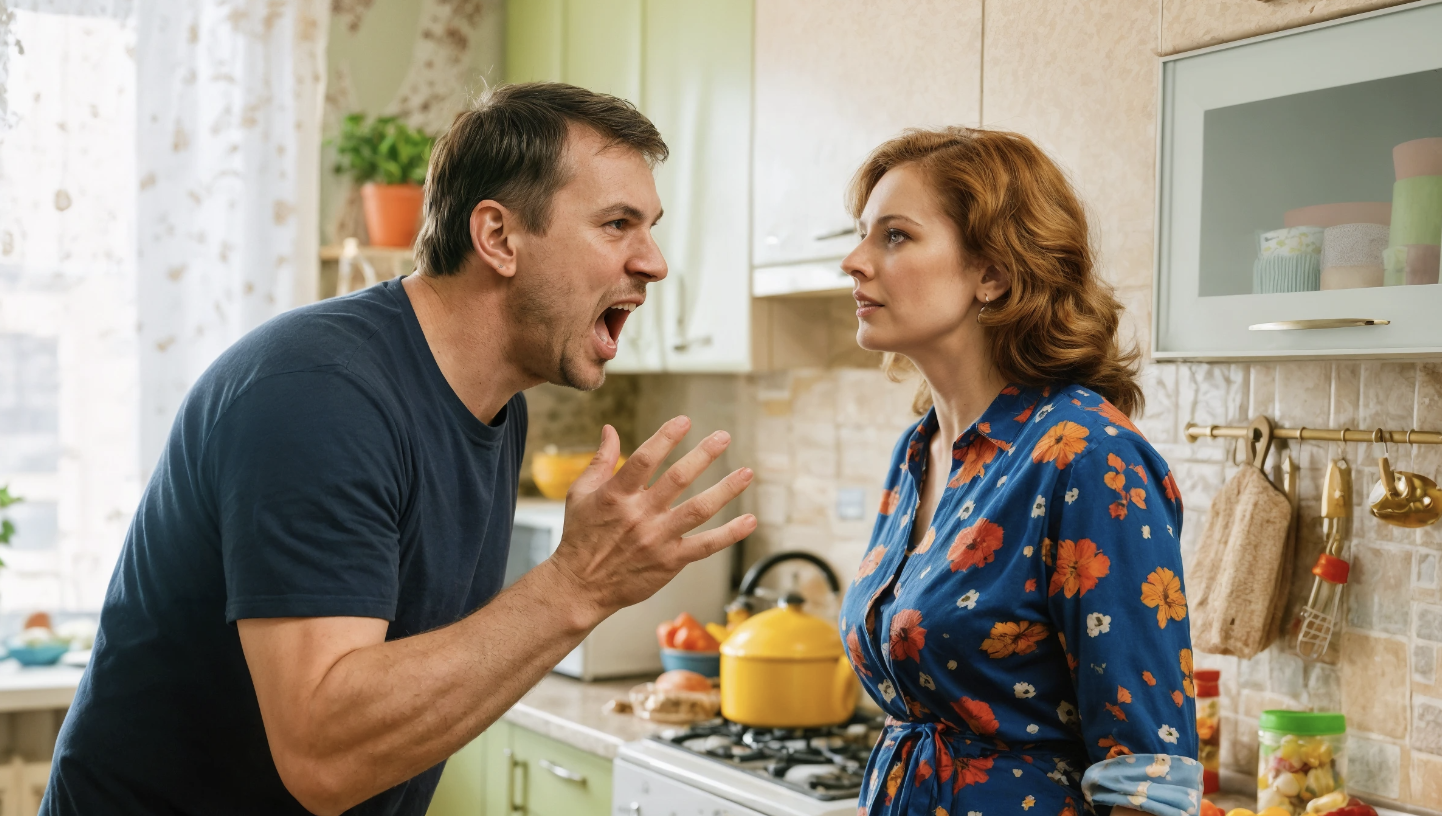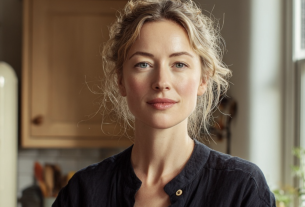Misha, pour me some more tea,” I asked without taking my eyes off the laptop.
Numbers were flashing on the screen — the daily revenue of my store. A good figure. Very good. Five years ago, I couldn’t have even dreamed of such money.
“Anya, you’re working late again,” Misha said, placing a steaming cup of tea in front of me. “It’s time to rest.”
I closed the laptop and looked at my husband. He looked tired. Lately, we often felt exhausted — not from work, but from the constant talks about money. More precisely, about who and how much I should give.
“Remember how we met?” I asked.
Misha smiled:
“You were such a lost freshman. Standing in the dean’s office, crying because you couldn’t pay for the dormitory.”
“And you came up and said, ‘Don’t cry, beautiful, it will all get sorted.’ And it really did. You took me in, married me, gave me the chance to study.”
“That was the right thing to do,” Misha said quietly. “I loved you.”
“I love you,” I corrected him. “Didn’t love — love.”
He nodded, but something trembled in his eyes. We both knew what the conversation was about now.
“Mom called,” he said after a pause.
I sighed. Valentina Petrovna had been calling every day for the past week.
“And what does your family want this time?”
“Anya, don’t say it like that…”
“How am I supposed to say it, Misha? Your brother took out a loan for furniture that costs as much as my entire first-year salary after university. Didn’t ask anyone, didn’t consult. Bought it — and that’s it. Now he can’t pay, and apparently, I’m supposed to help.”
Misha clenched his fists:
“We are family, Anya. Have you forgotten how they helped you?”
“I haven’t forgotten. I’ll never forget. But help and extortion are two different things.”
The phone rang. “Denis” appeared on the screen. I looked at Misha — he nodded, like “answer it.”
“I’m listening.”
“Anya, hi!” Denis’s voice sounded deliberately cheerful. “How are you? How’s the business?”
“Fine,” I answered briefly.
“Listen, do you remember we talked about my loan situation?”
“I remember.”
“Well, the bank called today. They said if I don’t pay tomorrow, they’ll start repossessing the property. Can you imagine?”
I could imagine. And I knew where this conversation was going.
“Denis, I’m not going to give you money.”
Silence. Then:
“What do you mean you’re not going to?”
“I mean I’m not. You’re an adult man with a job. Deal with your debts yourself.”
“Anya, are you crazy? You earn well! What’s it to you to help a relative?”
“It costs me a lifetime of cleaning up your financial messes.”
Denis’s voice became increasingly hysterical:
“But when you lived off us, you didn’t count!”
There it was — the phrase I was waiting for. The argument they had saved for a last resort.
“Denis,” I said very calmly, “when I lived ‘off you,’ as you put it, I was your brother’s wife and a student without a penny. Now you’re a working man who willingly got into debt, counting on my help.”
“How can you…”
“Very simply. Goodbye.”
I hung up. My hands were shaking — not from fear, but from anger. Misha looked at me with some kind of horror.
“Anya, what have you done?”
“What I should have done a long time ago.”
“But if he doesn’t pay…”
“Then he’ll get what he deserves. Adults must be responsible for their actions.”
Misha shook his head:
“You’ve become kind of harsh.”
“No, I’ve become independent. There’s a difference.”
The next day began what I called in my mind the “family war.” First, Valentina Petrovna called. Her voice was so tragic, as if I had killed her son.
“Dear Anya, what happened to you? How can you abandon Denis in such a situation?”
“Valentina Petrovna, I’m not abandoning him. I just refuse to solve problems he created himself.”
“But we’ve done so much for you! Sheltered you, fed you, clothed you…”
“For which I am immensely grateful. But that doesn’t mean I am now obligated to support your whole family for life.”
“How can you say that!” Tears appeared in my mother-in-law’s voice. “We loved you like a daughter!”
“And I love you. But love doesn’t mean unlimited financial support.”
“So, you won’t help?”
“I won’t.”
She hung up. An hour later, my father-in-law came. Sat in the kitchen, was silent for a long time, then spoke in a quiet, defeated voice:
“Anya, daughter, what are you doing? You’re destroying the family over money.”
“Pyotr Ivanovich, I’m not destroying the family. The family is destroyed by the consumer attitude towards me.”
“What consumer attitude? We love you!”
“Do you love me, or do you love my income?”
He sighed:
“You’re right to be angry. The boy has become irresponsible. But he is family after all…”
“Precisely because he is family, I can’t let him keep living like a spoiled teenager.”
My father-in-law left without achieving anything. I expected it to end there, but that evening Denis himself appeared at the door. His face was red, his eyes darting.
“Can I come in?” he asked, already squeezing into the hallway.
“Come in.”
We went to the living room. Denis nervously paced the room, then suddenly stopped and looked at me:
“What do you mean you won’t give me money?! Do you understand what the consequences will be?”
“I do,” I answered calmly.
“The bank will take the furniture! My credit history will be ruined! There will be fines!”
“I know.”
“And you still won’t help?!”
“I won’t.”
Denis sank into a chair, covered his face with his hands:
“I don’t understand what happened to you. You used to be normal, kind. And now… money has corrupted you.”
“No, Denis. Money corrupted you. You stopped thinking about consequences. Why bother if Aunt Anya is there to pay everything?”
“But we’ve done so much for you!”
“You did. And I appreciate that. But that’s not a lifetime indulgence.”
He looked up and stared at me with such hatred that I involuntarily recoiled:
“So, you used us and now threw us away like useless trash?”
“No, Denis. I’m trying to save what’s left of us. Before we completely turn into creditors and debtors.”
He stood and went to the door:
“Alright, remember this conversation. When you have problems, don’t count on our help.”
“I’m not counting on it,” I said quietly to his back.
The door slammed. I was left alone in the silence of the apartment and suddenly started crying. Not out of pity for myself — but relief. Finally, I said what I had wanted to say for a long time.
Misha came back late. Ate dinner silently, watched TV silently. Before bed, he asked:
“Won’t you change your mind?”
“No.”
“Then I’m ashamed of you.”
“And I’m ashamed of them. And of having tolerated it for so long.”
The following days passed in tense anticipation. I knew Denis would look for money, run around, call all his acquaintances. And I knew he would eventually find a way — not as comfortable as he hoped, but he would find it.
That’s exactly what happened. A week later he called. His voice was different — not demanding, but tired:
“Anya, I… I wanted to apologize for that conversation.”
“I’m listening.”
“I sold the car. Paid the bank, but there’s still debt left. Arranged a payment plan. I’ll pay monthly.”
“That’s right.”
“You know, you were right. I really stopped controlling my expenses. I thought I could always turn to relatives.”
My heart clenched with pity, but I forced myself to stay silent.
“Anya, can I come over? I want to talk properly.”
“Come.”
Denis came in the evening. He looked bad — lost weight, looked gaunt. But something new appeared in his eyes. Something mature.
“You know,” he said, slowly stirring his tea, “when I realized there would be no help, the first thing I wanted was to kill you. Then I sat down and for the first time in many years honestly counted how much I spend and how much I earn.”
“And what did you find?”
“I found out I live like the biggest spender. I buy everything I want, then wonder where to get the money.”
“And now?”
“Now I’m learning to live within my means. Sold the car, moved from a two-room apartment to a one-room, found a part-time evening job. Like normal people live.”
I looked at him and understood my harsh experiment had succeeded. Denis had truly grown up. Not immediately, not without pain, but he grew up.
“Forgive me,” he said quietly. “For all those words about you using us. I was wrong.”
“No need to apologize. You were desperate.”
“Not desperate, just used to it. Used to someone else solving problems for me.”
We sat in the kitchen for a long time, talking. For the first time in many years — as equals. Not as a beggar and benefactor, but as brother and sister.
When Denis left, I felt a relief I hadn’t known for a long time. My decision was right. Painful, conflictual, but right.
Valentina Petrovna was silent for another month. Then she called:
“Anya, can I come? I want to talk.”
“Of course, come.”
She came with her signature pies, sat in the kitchen, was silent for a long time. Then she said:
“You were right, daughter.”
“In what, Valentina Petrovna?”
“That we spoiled Denis. We solved his problems all his life — first me and his father, then Misha, then you. And he got used to it.”
“Not just him. All of us got used to it.”
“Yes, and us too. We started to take your help for granted. That’s wrong.”
I took her hand:
“Valentina Petrovna, I didn’t want to hurt anyone. I just realized it can’t go on like this.”
“You realized correctly. You know, Denis is a completely different person now. Responsible somehow. Sometimes even helps me and his father — not with money, but with work. Comes over, fixes something, goes shopping.”
“That’s good.”
“And we thought you hated us.”
“I don’t hate anyone. I just want us to have healthy relationships.”
We reconciled. Not immediately, not completely, but reconciled. Misha stopped being upset with me when he saw how his brother had changed. The family didn’t fall apart — on the contrary, it became stronger. Because now it was based not on financial dependence, but mutual respect.
And I realized that sometimes the greatest gift you can give a loved one is to say “no.” Even when you really want to say “yes.” Even when it feels like you’re being cruel and heartless. Because true love is not indulging weaknesses, but helping to overcome them.
Today, six months after that conflict, I stand by the window and look at the yard. The same view, the same trees. But I’m no longer the woman who once feared to hurt relatives by refusing. I have learned to say “no.” And that, it turned out, is the most important lesson in my life.



